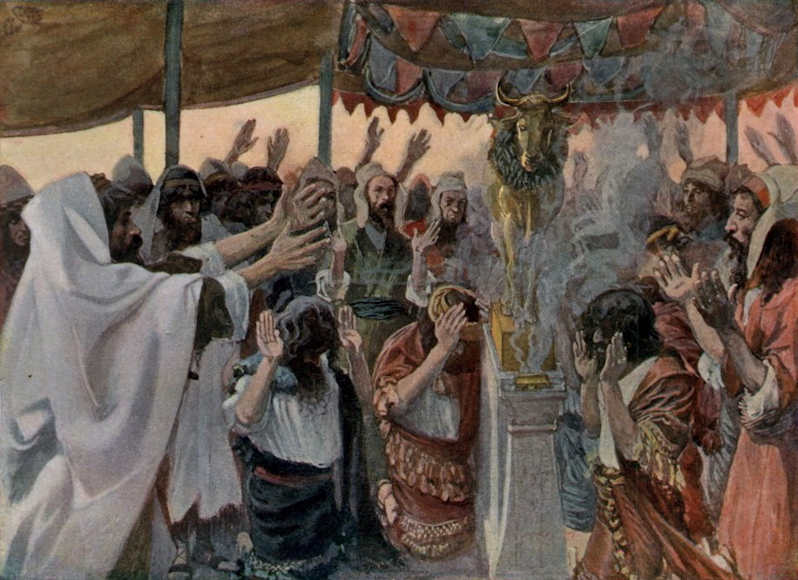Worship Him, all you gods!
The gods of the nations are addressed affirmatively in
scripture, even commanded to worship the living God: "Let all those be ashamed who serve graven
images, who boast themselves of idols; worship Him, all you gods."
(Psalm 97:7).
Some say that this proves the 'other gods' are rational, sentient
beings; how otherwise could they be capable of worship? One must
concede they are equally sentient as other entities to whom praise
is ascribed in the Bible, like the hills: "They drop upon the
pastures of the wilderness: and the little hills rejoice on every
side. The pastures are clothed with flocks; the valleys also are
covered over with corn; they shout for joy, they also sing." (Psalm
65:12-13). The gods of the nations will undoubtedly bow down before the living God. How do they do so?
Many of the things blindly worshipped by the nations are
real beings, but not one is a real god. Idols are
nothing in the world: "Therefore concerning the eating of things sacrificed to idols, we know that
there is no such thing as an idol in the world, and that there is no God but one."
(1 Corinthians 8:4).
"For all the gods of the people are idols, but the LORD made the heavens."
(Psalm 96:5).
At their lowest, the nations worship craft projects of wood
and stone: "What you have in your mind shall never be, when you say, 'We will be like the Gentiles,
like the families in other countries, serving wood and stone.'"
(Ezekiel 20:32). In spite of
their numbing behavioral disabilities, even the idols of wood and stone worship Him, simply because
it is God's good pleasure to make these deaf and dumb stocks and stones bow down to Him: "When the
Philistines took the ark of God, they brought it into the house of Dagon, and set it by Dagon. And
when they of Ashdod arose early on the morrow, behold, Dagon was fallen upon his face to the earth
before the ark of the LORD. And they took Dagon, and set him in his place again." (1 Samuel 5:2-3).
These inert worshippers bow before the living God when they are carried helplessly off into
captivity, unable to save the deluded souls who trusted in them: "Bel boweth down, Nebo stoopeth,
their idols were upon the beasts, and upon the cattle: your carriages were heavy loaden; they are
a burden to the weary beast." (Isaiah 46:1).
Some of the gods worshipped by the nations are, not sticks
and stones, but created beings of great magnitude and beauty, like the sun, moon, stars, planets.
These real beings are not real gods, no more than is
a lifeless idol. The sun is a creature of God, loyally attending to his post: "And the sun stopped
in the middle of the sky, and did not hasten to go down for about a whole day. And there was no day
like that before or after it, when the LORD listened to the voice of a man; for the LORD fought
for Israel." (Joshua 10:14-15).
Apostates from the faith of Israel imported sun-worship into the very Temple itself:
"And behold, at the entrance to the temple of the LORD, between the porch and the altar, were about twenty-five men
with their backs to the temple of the LORD and their faces toward the east; and they were prostrating themselves eastward toward the
sun." (Ezekiel 8:16);
"And he did away with the horses which the kings of Judah had given
to the sun, at the entrance of the house of the LORD..." (2 Kings 23:11).
Does the sun worship God? The Bible answer is, Yes! The sun
itself worships God, along with every other created thing: "Praise Him, all His angels; Praise Him, all
His hosts! Praise Him, sun and moon; Praise Him, all stars of light!"
(Psalm 148:2-3). If the
sun's worshipful stance toward the living God is to be taken as proof of his deity, the Jehovah's
Witnesses will be left with an odd lot of things in their pantheon, a mooing and lowing "Divine
Council," because "cattle" also praise the LORD: "Beasts and all cattle; Creeping things and winged
fowl..." (Psalm 148:10). Even little fishes in the deep blue sea worship God and the Lamb: "And every
created thing which is in heaven and on the earth and under the earth and on the sea, and all things
in them, I heard saying, 'To Him who sits on the throne, and to the Lamb, be blessing and honor and
glory and dominion forever and ever.'" (Revelation 5:13). Hmmm...our pantheon is getting alarmingly
crowded, and perhaps some kitty litter needs to be set out before it becomes fouled and the Health
Department steps in. And wait a minute — since when is worshipping God a proof of one's own deity? Men
worship God alongside the sun so futilely deified!
As to how the sun gives his testimony, it is by shining.
"Things not endowed the comprehension, as e.g., minerals, may also
be considered as glorifying the Lord, for by their natural
properties they testify to the omnipotence and wisdom of their
Creator, and cause him who examines them to praise God, by means of
speech or without the use of words, if the power of speech be
wanting." (Moses Maimonides, A Guide for the Perplexed, p. 115). All of creation,
except for man and the fallen angels and demons, loyally serve God at the posts to which He has
assigned them. They have fallen into futility through man's fall, inasmuch as their ordained
purposes cannot be met, through no fault of their own: "For the creation was subjected to futility,
not of its own will, but because of Him who subjected it, in hope that the creation itself also
will be set free from its slavery to corruption into the freedom of the glory of the children of
God." (Romans 8:20-21). They haven't minds to formulate praises, nor
tongues to express them, but neither did Paul pray with
his conscious mind when He spoke in tongues: "For you are giving thanks well enough, but the other
man is not edified." (1 Corinthians 14:17). God accepts their testimony as they offer it.
Those who bowed to the sun, moon and stars were serving real
things, but not real gods. "Fire, wind, swift air, the
circle of the starry signs, rushing water, or the great lights in heaven that rule the world—
these they accounted gods." (Wisdom of Solomon 13:2). Hear this
pagan call out to his gods: "With a heart on fire Claudius sprang up
in disorder from his slumber. Then he raised both hands to heaven
and prayed devoutly to Earth and Night, to the Stars that strewed
the sky, and the Moon whose silent light was to lead them on their
way." (Silius Italicus, Punica, Book XV, Kindle location 4673).
Which of Claudius' gods is unreal? These are big, honking huge
inanimate objects. And that presents a problem, as they may be
somewhat lacking in empathy. Moreover, what Claudius wants from
them, success in battle, may fall somewhat outside of their sphere
of competence. The way the pagans visualized these objects: Apollo
with his shining steeds yoked to a glittering chariot, — was
fanciful and pointed to nothing real in the world. Still, at bottom,
these are real constituents of the world system; there is a sun
radiating up there in the sky.
Philo explains their error,
"There is an error of no small importance which has taken possession of the greater portion of mankind concerning a subject which was likely by itself, or, at least, above all other subjects, to have been fixed with the greatest correctness and truth in the mind of every one; for some nations have made divinities of the four elements, earth and water, and air and fire. Others, of the sun and moon, and of the other planets and fixed stars. Others, again, of the whole world. And they have all invented different appellations, all of them false, for these false gods put out of sight that most supreme and most ancient of all, the Creator, the ruler of the great city, the general of the invincible army, the pilot who always guides everything to its preservation; for they call the earth Proserpine, and Ceres, and Pluto. And the sea they call Neptune, inventing besides a number of marine deities as subservient to him, and vast companies of attendants, both male and female. The air they call Juno; fire, Vulcan; and the sun, Apollo; the moon, Diana; and the evening star, Venus; Lucifer, they call Mercury; and to every one of the stars they have affixed names and given them to the inventors of fables, who have woven together cleverly-contrived imaginations to deceive the ear, and have appeared to have been themselves the ingenious inventors of these names thus given."
(Philo Judaeus, The Decalogue, 52-55, Chapter XII).
|

